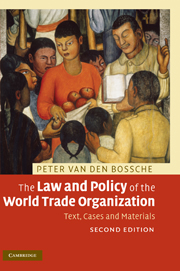Book contents
- Frontmatter
- Contents
- List of figures
- Preface to the first edition
- Preface to the second edition
- Table of cases
- Table of agreements
- 1 ECONOMIC GLOBALISATION AND THE LAW OF THE WTO
- 2 THE WORLD TRADE ORGANIZATION
- 3 WTO DISPUTE SETTLEMENT
- 4 PRINCIPLES OF NON-DISCRIMINATION
- 5 RULES ON MARKET ACCESS
- 6 RULES ON UNFAIR TRADE
- 7 TRADE LIBERALISATION VERSUS OTHER SOCIETAL VALUES AND INTERESTS
- 8 TOWARDS HARMONISATION OF NATIONAL REGULATION
- Epilogue
- Index
8 - TOWARDS HARMONISATION OF NATIONAL REGULATION
Published online by Cambridge University Press: 05 June 2012
- Frontmatter
- Contents
- List of figures
- Preface to the first edition
- Preface to the second edition
- Table of cases
- Table of agreements
- 1 ECONOMIC GLOBALISATION AND THE LAW OF THE WTO
- 2 THE WORLD TRADE ORGANIZATION
- 3 WTO DISPUTE SETTLEMENT
- 4 PRINCIPLES OF NON-DISCRIMINATION
- 5 RULES ON MARKET ACCESS
- 6 RULES ON UNFAIR TRADE
- 7 TRADE LIBERALISATION VERSUS OTHER SOCIETAL VALUES AND INTERESTS
- 8 TOWARDS HARMONISATION OF NATIONAL REGULATION
- Epilogue
- Index
Summary
INTRODUCTION
As discussed in chapters 4 and 5 of this book, tariffs, quotas and discriminatory treatment of imports are subject to effective WTO disciplines. Their importance as barriers to trade has thus gradually decreased. As noted in chapter 5, ‘other non-tariff barriers’ to trade, such as technical regulations, standards, sanitary and phytosanitary measures, customs formalities and government procurement practices, have, however, gained in importance and have in fact become more problematic to international trade than tariffs and quotas, the ‘traditional’ barriers to trade. Several WTO agreements, and in particular the GATT 1994, address such ‘other non-tariff barriers’ to trade. These agreements focus on diminishing the negative trade effects of ‘other non-tariff barriers’ by increasing their transparency, ensuring their fair and non-discriminatory application and reducing unnecessary procedural delays and complexities.
However, three WTO agreements go further in addressing ‘other non-tariff barriers’ to trade by, in addition to the usual WTO disciplines, promoting regulatory harmonisation around international standards. These are the TRIPS Agreement, the TBT Agreement and the SPS Agreement. All three of these agreements rely on standards set by other (i.e. non-WTO) international bodies as a basis for their harmonisation obligations, thereby making use of the established expertise of these international bodies. However, these three agreements work in different ways with the tool of harmonisation. The TRIPS Agreement lays down mandatory minimum standards of intellectual property protection and enforcement, based on pre-existing international conventions.
- Type
- Chapter
- Information
- The Law and Policy of the World Trade OrganizationText, Cases and Materials, pp. 740 - 891Publisher: Cambridge University PressPrint publication year: 2008



